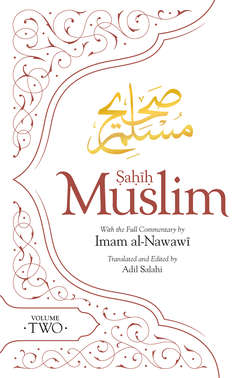Читать книгу Sahih Muslim (Volume 2) - Imam Abul-Husain Muslim - Страница 27
На сайте Литреса книга снята с продажи.
ОглавлениеCHAPTER 38
ASSOCIATING PARTNERS WITH GOD IS THE WORST OF ALL SINS; THE GRAVEST SINS AFTER THAT
[146–141]. (Dar al-Salam 0156) [Uthman ibn Abi Shaybah and Ishaq ibn Ibrahim narrated:i Ishaq said: Jarir reported, but [Uthman said: Jarir narrated; from Mansur; from Abu Wa’il; from [Amr ibn Shurahbil; from [Abdullah, who said: ‘I asked God’s Messenger (peace be upon him): “Which sin is the most serious in God’s sight?” He said: “To set up an equal to God when it is He who has created you.” I said: “That is grave indeed. Which comes next?” He said: “To kill your child so that you do not have to feed it”. I said: “Which is next?” He said: “To commit adultery with your neighbour’s wife”.’
حَدَّثَنَا عُثْمَانُ بْنُ أَبِي شَيْبَةَ، وَإِسْحَاقُ بْنُ إِبْرَاهِيمَ، قَالَ إِسْحَاقُ أَخْبَرَنَا جَرِيرٌ، وَقَالَ عُثْمَانُ حَدَّثَنَا جَرِيرٌ، عَنْ مَنْصُورٍ، عَنْ أَبِي وَائِلٍ، عَنْ عَمْرِو بْنِ شُرَحْبِيلَ، عَنْ عَبْدِ اللهِ قَالَ: سَأَلْتُ رَسُولَ اللهِ صَلَّى اللهُ عَلَيْهِ وَسَلَّمَ: أَىُّ الذَّنْبِ أَعْظَمُ عِنْدَ اللهِ؟ قَالَ: «أَنْ تَجْعَلَ للهِ نِدًّا وَهُوَ خَلَقَكَ». قَالَ: قُلْتُ لَهُ: إِنَّ ذَلِكَ لَعَظِيمٌ. قَالَ: قُلْتُ ثُمَّ أَىٌّ؟ قَالَ: «ثُمَّ أَنْ تَقْتُلَ وَلَدَكَ مَخَافَةَ أَنْ يَطْعَمَ مَعَكَ». قَالَ: قُلْتُ ثُمَّ أَىٌّ؟ قَالَ: «ثُمَّ أَنْ تُزَانِيَ حَلِيلَةَ جَارِكَ».
[147–142]. (Dar al-Salam 0157) [Uthman ibn Abi Shaybah and Ishaq ibn Ibrahim narrated both from Jarir: Ishaq said: Jarir narrated; from al-A[mash; from Abu Wa’il; from [Amr ibn Shurahbil: [Abdullah said: ‘A man asked: “Messenger of God, which sin is the most serious in God’s sight?” He said: “That you set up an equal to God when it is He who has created you”. The man said: “Which comes next?” He said: “To kill your child so that you do not have to feed it”. I said: “Which is next?” He said: “To commit adultery with your neighbour’s wife”. God then revealed its confirmation: “[God’s servants] never invoke any deity side by side with God, and do not take any human being’s life—[the life] which God has willed to be sacred—except for a just cause, and do not commit adultery. Whoever does any of this will face punishment”.’ (25: 68)20
حَدَّثَنَا عُثْمَانُ بْنُ أَبِي شَيْبَةَ، وَإِسْحَاقُ بْنُ إِبْرَاهِيمَ، جَمِيعًا عَنْ جَرِيرٍ، قَالَ عُثْمَانُ حَدَّثَنَا جَرِيرٌ، عَنِ الأَعْمَشِ، عَنْ أَبِي وَائِلٍ، عَنْ عَمْرِو بْنِ شُرَحْبِيلَ قَالَ: قَالَ عَبْدُ اللهِ: قَالَ رَجُلٌ: يَا رَسُولَ اللهِ، أَىُّ الذَّنْبِ أَكْبَرُ عِنْدَ اللهِ؟ قَالَ: «أَنْ تَدْعُوَ للهِ نِدًّا وَهُوَ خَلَقَكَ». قَالَ ثُمَّ أَىٌّ؟ قَالَ: «أَنْ تَقْتُلَ وَلَدَكَ مَخَافَةَ أَنْ يَطْعَمَ مَعَكَ». قَالَ ثُمَّ أَىٌّ؟ قَالَ: «أَنْ تُزَانِيَ حَلِيلَةَ جَارِكَ». فَأَنْزَلَ اللهُ عَزَّ وَجَلَّ تَصْدِيقَهَا: «وَالَّذِينَ لاَ يَدْعُونَ مَعَ اللهِ إِلَهًا آخَرَ وَلاَ يَقْتُلُونَ النَّفْسَ الَّتِي حَرَّمَ اللهُ إِلاَّ بِالْحَقِّ وَلاَ يَزْنُونَ وَمَنْ يَفْعَلْ ذَلِكَ يَلْقَ أَثَامًا».
Text Explanation
20. The Prophet makes clear that the gravest sin of all is to associate partners with God, which is at times expressed as setting up equals to Him. The next is to kill one’s child so that one does not have to feed it. This is similar to the Qur’anic order: ‘Do not kill your children for fear of poverty’. (17: 31)
The Prophet mentions that committing adultery with one’s neighbour’s wife is one of the gravest sins. The way he expresses this confirms that the offender does it with the woman’s consent, but the man would have tempted and seduced her. To go to such temptation with any woman is worse than merely committing adultery with her, but to do it with a neighbour’s wife is far more repugnant and a more serious crime. Neighbours are expected to protect one another and to take care of their neighbours’ families. Moreover, Islam commands us to be kind to our neighbours and be generous with them. To do the opposite and go beyond that so as to reach the stage of corrupting a neighbour’s wife and seducing her to the point of adultery is a most ghastly sin.
The verse quoted in the second hadith gives the commandment: ‘Do not take any human being’s life—[the life] which God has willed to be sacred—except for a just cause’. This means that human life is initially sacred. It may not be taken away, except for a just cause, which means committing an offence that incurs the death penalty.
This hadith, in its two versions, tell us that the worst of all sins is to associate partners with God. This is absolutely clear. It is followed by unwarranted murder. Scholars of our Shafi[i School say: ‘The gravest of sins, next to associating partners with God, is murder’. The same is stated by al-Shafi[i himself. Other grave sins, such as adultery, sodomy, undutifulness to parents, black magic, false accusation of women, desertion at the time of battle, devouring usury and similarly grave sins are subject to certain rules and details that determine their seriousness. They may differ according to circumstances and the evil they lead to. Therefore, each one of them is described as ‘one of the gravest sins’. If any of them is stated at times as ‘the gravest of all sins’, this means no more than that it ranks among the gravest sins, just as we said about the best deeds, but God knows best.
Transmission
The two chains of transmission feature a particularly interesting point, which is that their narrators are all from Kufah. This is a rare case of all the narrators of two consecutive hadiths belonging to the same city. Jarir’s full name is Jarir ibn [Abd al-Hamid, while Mansur is Ibn al-Mu[tamir and Abu Wa’il is Shaqiq ibn Salamah.
i.Related by al-Bukhari, 4207, 4483, 5655, 6426, 6468, 7082 and 7094; Abu Dawud, 2310; al-Tirmidhi, 3182; al-Nasa’i, 4024.
